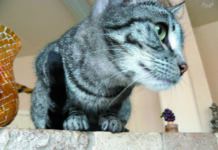THINKSTOCK


Cats are well known for being exceptionally clean animals. They take pride in their appearance — grooming constantly to remove any offensive odors that might make them detectable to both predators and prey. Occasionally, however, cats sometimes do emit a foul odor. Although there are several possible reasons for a cat to be malodorous, halitosis (bad breath) is the most common cause of fetid felines.
Common Causes of Bad Breath in Cats
Periodontal disease — inflammation of the tissues surrounding the teeth — is by far the most common cause of bad breath in cats. Periodontal disease is initiated by a build-up of plaque, the sticky bacteria-laden coating on the tooth surface. As the immune system responds to the plaque, the gums become inflamed. Gum inflammation is called gingivitis, and it is the first stage of periodontal disease. Bad breath often accompanies the gingivitis.
As inflammation progresses, the second phase of periodontal disease — periodontitis — occurs. Periodontitis is a condition where both the soft tissues and the bony tissues are affected. Cats may develop receding gums, bone loss and continuing halitosis. If not removed from the tooth, plaque mineralizes into tartar (also called calculus) in a few days. Calculus requires professional removal by your veterinarian.
Although periodontal disease and gingivitis tend to develop as cats age, gingivitis can occur in cats as young as six months. These cats often have little or no calculus accumulation. We call this condition “juvenile-onset gingivitis,” and it is a common cause of halitosis in kittens.
The exact cause of this condition is unknown, but experts believe that genetics may play a role because purebred cats — especially Abyssinians, Siamese and Persians — are predisposed. If left untreated, these cats may develop significant periodontal disease early in their adulthood. Daily at-home oral care is recommended in cats with juvenile-onset gingivitis in order to avoid future dental problems.
Infections or abscesses can also cause foul odors from the mouth. Tooth-root abscesses are common in cats, usually resulting in facial swelling near the site of the affected tooth. Tooth-root abscesses need to be lanced and drained by your veterinarian, and the affected tooth is likely to require extraction.
Ulcers in the mouth can also result in halitosis. The calicivirus is a common cause of feline upper respiratory infections. Although sneezing, runny eyes and a snotty nose may be seen in affected cats, an ulcer on the tongue is the classic finding in cats infected with calicivirus.
Unfortunately, tumors of the oral cavity are not uncommon in cats, and halitosis is a frequent accompanying symptom. The most common feline oral tumors are squamous cell carcinoma and fibrosarcoma.
As these tumors grow, a portion of the tumor may become infected or necrotic (non-viable), leading to an unpleasant smell from the mouth. Early detection and aggressive treatment are essential for therapy to be successful. Unfortunately, by the time most cats are showing clinical signs of their oral tumor, the condition has already progressed to a point where treatment isn’t possible.
THINKSTOCK


When Bad Breath Indicates Feline Illness
Disorders of oral origin aren’t the only cause of halitosis in cats. Systemic illnesses — such as kidney disease — can lead to bad breath in cats. The role of the kidneys is to filter toxins from the bloodstream — creating urine in the process — and as most cats age, they eventually begin to show signs that their kidneys are weakening.
These signs may include excessive thirst, increased urination, poor appetite, weight loss and vomiting. As the kidney dysfunction progresses, cats may develop a condition called uremia, literally “urine in the blood.” Uremia generally refers to cats with severely elevated toxins in their bloodstream.
Uremia results in a characteristically foul odor from the mouth. The smell differs from the bad smell caused by dental disease. Cats with severe uremia will sometimes develop ulcers in their mouths, often on the sides of the tongue. These ulcers contribute further to the halitosis.
Diabetes is a common glandular disorder in cats due to inadequate or improper secretion of the hormone insulin from the pancreas. Insulin is required for the utilization of glucose, which is the primary source of energy in cats. Cats with diabetes usually require twice daily injections of insulin to maintain proper blood glucose levels. If the diabetes remains undiagnosed or untreated, cats will metabolize body fat into molecules called ketones in a desperate attempt to provide energy to the body.
When a Cat’s Breath Indicates Ketosis
Ketosis is a veterinary emergency, and affected cats are usually very ill. Cats in ketosis have a characteristic smell to their breath. The odor has been described by some as being “fruity,” while others describe it as faintly resembling acetone, the main ingredient in nail polish remover. Whether ketone-breath qualifies as being offensive, like halitosis, is debatable. Interestingly, people vary in their ability to detect this smell in cats, and apparently, the ability to detect it is genetic. Some veterinarians have the gene that allows them to detect ketones instantly, while others are oblivious.
And finally, it should be said that halitosis is sometimes in the nose of the beholder. Many cats have been brought to the veterinarian with the complaint of bad breath — and upon examination, the cats were discovered simply to have, for lack of a better term, “fish breath.” Their mouths were normal — no dental disease, no oral pathology of any kind — and they had no systemic illness.
Cat owners need to realize that if you feed your cat stinky food, she may end up with stinky breath. However, because there are so many significant medical conditions that can lead to halitosis in cats, it’s always best to err on the side of caution and have any offensive oral odors evaluated by a veterinarian.




